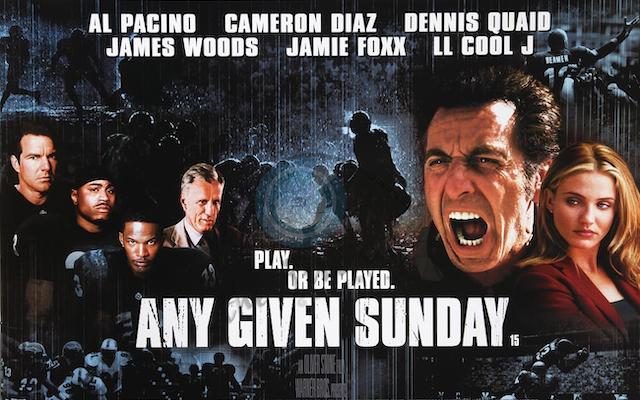
I’m not sure I want to admit how many Oliver Stone films I’d seen before I saw Any Given Sunday in December 1999. The answer would be a very low number, and it wouldn’t include JFK or Wall Street. Any Given Sunday was definitely my first big-screen Stone experience, as well as the first film he’d released in the short time I’d been pretending to be a movie critic. It felt like an Event, you know?
The movie kind of blew me away. I gave it a glowing A-minus review and said some hyperbolic things that we’ll get to in a minute. There were plenty of other critics who liked it too, though (it’s at 50% on Rotten Tomatoes), including Roger Ebert, Time’s David Ansen, and Entertainment Weekly’s Owen Gleiberman. I wasn’t totally out in left field (or right field, or however that metaphor goes). Still, I thought there was a good chance the passage of time would make me love the film a little less if I saw it again.
What I said then:
Oliver Stone’s Any Given Sunday is the Saving Private Ryan of football movies. Just as World War II films had been done before but would change forever after Spielberg took a turn, the genre of football movies (indeed, the genre of sports movies in general) will from now on have to answer to this one, an epic-length, obscenely realistic examination of every angle of professional football…. We see the game from the perspective of the players, the coaches, the media, the fans and the people watching on TV — and in each case, we’re made to feel like we’re RIGHT THERE with them (which, you’ll recall, was what people loved so much about Saving Private Ryan)…. [Cameron] Diaz is badly miscast as the general manager [but] nearly everyone else in the ensemble is terrific…. It’s like Stone is making violent, passionate love to the game of football…. It’s a visually exciting movie, dazzling in its whole-hearted use of mind-bending images…. I could hardly take my eyes off the screen. It’s unflinchingly real, but explosively entertaining, too. Grade: A- [complete review]
Yikes, what was THAT all about? “The Saving Private Ryan of football movies”? Every sports movie from now on will be compared to this one? “Mind-bending images”? The hell??
This is an embarrassing reminder that one thing a critic should never, ever do is make predictions about how a movie will be perceived in the future. None of this “destined to be a classic” nonsense. Because you don’t know. Nobody knows. You’ll usually end up being wrong. And anyway, who cares? Your audience wants to know whether they should go see the movie now, not whether it will be viewed as a milestone a decade from now. Learn from my mistakes, people.
The re-viewing:
My 1999 review suggests that I thought the football sequences in Any Given Sunday were as brutally, bone-crunchingly realistic as the battle scenes in Saving Private Ryan. Watching it again, I don’t know where I got that idea. Oh, the hits are powerful, sure. The crisp sound design and razor-sharp editing brings it all to life. But it doesn’t even approach the relentless, devastating realism of SPR. In fact, I’m almost certain I’ve seen other football movies since then whose game scenes were as hard-hitting as these. It’s entirely possible that I hadn’t seen many football movies at all when I saw Any Given Sunday, let alone any of the gritty, bone-crunchy variety.
But I do still think Stone’s movie does a terrific job encapsulating what professional football means in America. Not just the game itself, but the physical demands, the business aspect, the team politics, the fame-and-glory element, the devoted fans, the racial component — you get a sense of football’s prominence in American life, the sheer hugeness of it. As with most Oliver Stone movies, you can debate whether his depiction of the subject is sensationalized, but I think this is a basically accurate picture.
I also like the way the film covers so many different types of people within the football system, all of them desperate in some way: the aging player and aging coach worried about being replaced, the hotshot whose head swells with sudden stardom, the young heiress who owns the team and is out of her depth, the player who will knowingly trade his health to keep playing. The movie is long, but it has a lot going on, and the screenplay — by John Logan, who would go on to write Gladiator and The Aviator — often conveys character information very efficiently. For example, we only have a few scenes of the Dennis Quaid character with his wife (played by Lauren Holly), but we understand the tense dynamics of their relationship.
Al Pacino and Jamie Foxx have a scene together that’s vintage Stone. It’s when the coach and his showboating new quarterback are having dinner at the coach’s house, arguing about everything football-related other than the game itself. The dialogue is rapid and aggressive, the performances solid, and it’s manically edited. (It’s no surprise that there are four editors credited on the film, three more than are credited on most movies.) And the discussion is intercut with images from completely outside the reality of the characters: snippets of footage from Ben-Hur — the chariot race and then the galley ship, when Foxx mentions slavery — and old black-and-white football games, like visual aids for Pacino and Foxx’s argument. Say what you will about the effectiveness of such audacious storytelling techniques, how many current filmmakers besides Stone would even try them?
Do I still love this movie?
No, I’ve definitely come down from the “love” part of the scale. I’m still in the “like a lot” section, though. The film didn’t dazzle me the way it did 12 years ago, probably because I’ve seen so many movies since then with as much (or more) visual panache. There certainly isn’t anything I’d call “mind-bending images” here, nor can I figure out what I was referring to when I said it the first time. But it’s a good movie, muscular and entertaining, and bombastic in a likable way. Grade: B
— Film.com




